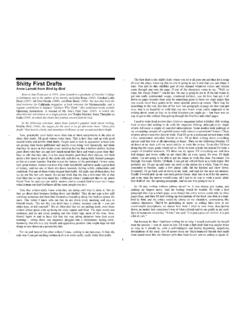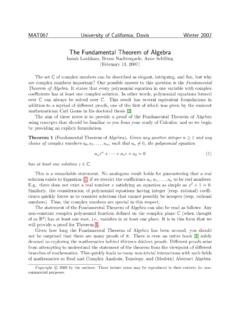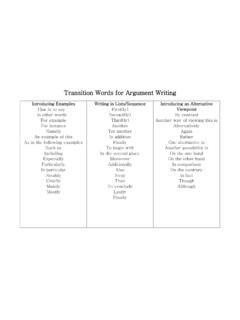Transcription of The Friday Everything Changed - PBworks
1 The Friday Everything Changed anne Hart Tradition. In Miss Ralston's class the boys have always carried the water bucket. Until one day, the girls decide it's time to challenge the rule.. The last hour of school on Friday afternoons was for Junior Red Cross. The little kids would get out their Junior Red Cross pins and put them on and us big kids would start elbowing down the aisles to the book cupboard at the back to see who would get the interesting magazines. There was a big pile of them and they were of two kinds: the National Geographic and the Junior Red Cross News. Because the boys were stronger and sat near the back they usually got the National Geographics first, which meant they could spend the rest of Red Cross looking at African ladies wearing nothing on top, while us girls had to be satisfied with the Junior Red Cross News, which showed little African kids wearing lots of clothes and learning how to read.
2 Apart from the magazines for the big kids and maybe the teacher reading a story to the little kids, about the only other thing that happened regularly during Red Cross was picking the two boys who would carry water the next week. In our school the water bucket always stood on a shelf at the front of the room just behind the teacher's desk. First you'd make a paper cup out of a piece of scribbler paper, then you'd grab the teacher's attention from wherever it happened to be and then up you'd go to the front of the room for a drink from the water bucket. I t was kind of interesting to stand at the front of the room behind the teacher's desk and drink water. The school looked different from up there and sometimes you could get just a glimpse of an idea of what the teacher thought she was all about.
3 I mean, from the front, looking down on those rows of kids with their heads bent over their desks and the sun coming in the windows and the blackboards and all that stuff on the walls, you might almost think, at first glance, that you were looking at one of those real city schools -like in the health books-where the kids were all so neat and all the same size. But after the first strange moment it just became our school again, because you had to start adding in things like the coal stove and the scarred old double desks and the kids themselves. I mean, we just didn't look like the kids in those pictures. Maybe it was because we were so many different sizes-from the kids snuffling in the front rows over their Nan and Dan readers to the big boys hunched over their desks at the back-maybe it was because we wore so many heavy clothes all the time, or maybe it was because of something that wasn't even there at all but seemed to be on the faces of the kids in those city pictures: a look as if they liked being where they were.
4 But all that's a long way from Junior Red Cross and who would carry the water . The water for our school came from a pump at the railway station, which was about a quarter of a mile away. One day long ago a health inspector had come around and had announced that water must be made available to the school. For a while there had been some talk of digging a well but in the end we got a big, shiny, galvanized water bucket and permission to use the railway station pump. And from that day on-for all the boys-the most important thing that happened at school, even more important than softball, was who would get to carry the water. If you were a boy it was something you started dreaming about in Grade I, even though there was not the remotest chance it could ever happen to you before at least Grade 5, and only then if the teacher thought you were big and strong enough.
5 You dreamed about it partly because carrying the water meant you were one of the big guys, and carrying the water meant you could get away from school for maybe half an hour at a time. But mostly you dreamed about it because carrying the water was something real, and had absolutely nothing whatever to do with Nan and Dan and all that stuff. So every Friday afternoon toward the end of Red Cross, when it got to be time for the teacher to pick the two boys who would go for water the next week, all the National Geographics came to rest like huge butterflies folding up their yellow wings and a big hush fell all over the back rows. And that's the way it had always been until one extraordinary afternoon when, right out of the blue, just after the teacher had picked Ernie Chapman and Garnet Dixon to carry the water, my seatmate, Alma Niles, put up her hand and said: "Why can't girls go for the water, too?
6 " If one of those German planes, like in the war movies, had suddenly appeared over the school and dropped a bomb, we all couldn't have been more surprised. A silence fell over the room and in that silence everyone looked at the teacher . Now our teacher that year was named Miss Ralston and even though she came from River Hibbert we all liked her quite a lot. She was strict but she was never really mean like some of the teachers we'd had. Because she was young (she'd just finished Grade 11 the year before herself-River Hibbert had fancy things like Grade 11) she'd had quite a rough time the first week of school with the bigger boys. But she was pretty big herself and after she'd strapped most of them up at the front of the room before our very eyes (and even the little kids could see that it really hurt) things had settled down.
7 The boys kind of admired Miss Ralston for strapping so hard, and us girls admired her because she was so pretty and wore nylon stockings and loafers all the time. But the really unusual thing about Miss Ralston was the way she sometimes stopped in the middle of a lesson and looked at us as if we were real people, instead of just a lot of kids who had to be pushed through to their next grades. And that was why, on that Friday afternoon when Alma Niles put up her hand and said: "Why can't girls go for the water, too?" we all turned and looked at Miss Ralston first instead of just bursting out laughing at Alma right away. And Miss Ralston, instead of saying, "Whoever heard of girls going for the water?
8 " or, " Are you trying to be saucy, Alma?" like any other teacher would, said nothing at all for a moment but just looked very hard at Alma, who had gone quite white with the shock of dropping such a bombshell. After a long moment, when she finally spoke, Miss Ralston, instead of saying, "Why that's out of the question, Alma," threw a bombshell of her own: "I'll think about that," she said-as if, you know, she would-"and I'll let you know next Friday ." The trouble started right away as soon as we got into the school yard, because all the boys knew, from the moment Miss Ralston had spoken, that something of theirs was being threatened and that, as long as there was the remotest chance that any girl might get to carry the water, they had to do Everything in their power to stop it.
9 Like driving a tractor or playing hockey for the Toronto Maple Leafs, carrying water was real, and because it was real it belonged to them. So they went right for Alma as soon as she came out of school and that was when another funny thing happened. Instead of just standing back and watching Alma get beaten up, as we usually did when the boys were after someone, the girls rushed right in to try and help her. In the first place we all liked Alma, and in the second place we all had seen, as clearly as the boys, what our carrying the water might mean; that, incredibly, we, too, might get to skip school for half an hour at a time, that we, too, might get to sneak into Rowsell's store on the way back and, most dizzying thought of all, that we too might get to do something real.
10 And, because we were so intoxicated by the whole idea, and took the boys so much by surprise by standing up to them, we somehow managed to get Alma and ourselves out of the schoolyard with only a few bruises and torn stockings, leaving the boys in possession of the schoolyard where, as we could glimpse over our shoulders as we ran down the hill, they had begun to gather together in a single ominous knot. And for the rest of that weekend, though of course we never talked about it in front of our parents, all we could think of, both boys and girls, was what was going to happen at school that coming week. The first thing, clearly evident by recess on Monday morning, was that the boys had decided not to let us girls field at softball any more.







